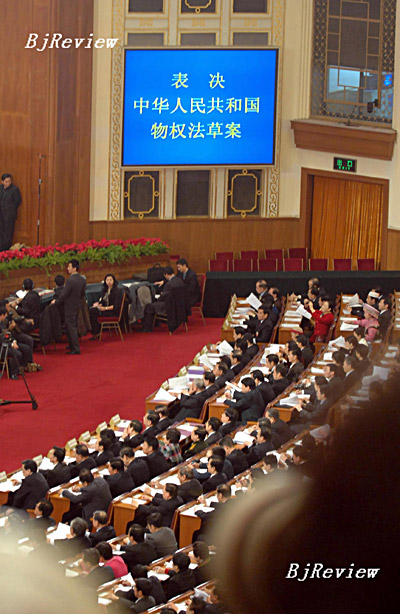
China's top legislature, the National People's Congress (NPC), adopted a landmark property law here Friday morning, granting equal protection to public and private properties.
It only took less than a minute for the nearly 3,000 NPC lawmakers to pass the much-revised bill, which had gone through a lengthy legislation process of more than 13 years, by an overwhelming majority as the NPC concluded its annual full session in the Great Hall of the People in downtown Beijing.
The lawmakers applauded warmly after NPC Standing Committee Chairman Wu Bangguo announced the voting results. A total of 2,799 lawmakers voted for the law and 52 against. Thirty-seven abstained and one didn't cast vote.
The 247-article law, which is due to come into effect as of Oct. 1, 2007, stipulates that "the property of the state, the collective, the individual and other obligees is protected by law, and no units or individuals may infringe upon it".
This is the first time that equal protection to state and private properties has been enshrined in a Chinese law, which analysts say marks a significant step in the country's efforts to further economic reforms and boost social harmony.
China's state and private properties once suffered from serious violations due to a lack of respect for and protection of property rights.
"The significance of the law's adoption lies in the fact that it helps complete China's property rights system," commented Jiang Ping, former president of the Chinese University of Politic Science and Law.
"Only when people's lawful property is well protected could they have the enthusiasm to create more wealth and could China maintain its economic development," said Jiang, a scholar involved in the early drafting of the law.
The concept of improving the protection of private property was first brought up at the 16th National Congress of the ruling Communist Party of China (CPC) held in November 2002. In March 2004, the NPC adopted a major amendment to the Chinese Constitution, stating that people's lawful private property is inviolable.
Wang Shengming, deputy director of the Commission of Legislative Affairs of the NPC Standing Committee, said the hard-won property law "reflects the spirit of the Constitution" and "adheres to the reform and opening-up policy".
"It's a significant progress in promoting rule of law in the country," he said.
The draft of the property law was first submitted to the NPC Standing Committee in 2002 and had been reviewed for an unprecedented seven times before it finally reached this year's parliament session for final approval.
In response to doubts about equally protecting state and private properties, Vice Chairman of NPC Standing Committee Wang Zhaoguo said that under China's socialist market economy, all players enjoy the same rights, observe the same rules and bear the same responsibilities.
If equal protection is not secured, "it will not be possible to develop the socialist market economy, nor will it be possible to uphold and improve the basic economic system of socialism," said Wang, when tabling the bill to lawmakers last Thursday.
To address public concerns over fraudulent acquisitions and mergers of state property, the law stipulates that illegal possession, looting, illegal sharing, withholding or destruction of state property is prohibited. Those who cause loss of state property shall bear legal liability, according to the law.
In a move to better protect farmers from land seizures, which frequently caused public anger, the law stresses the protection of arable lands, stipulating that the transformation of land for agriculture into land for construction is "strictly restricted".
For expropriation of collective-owned land, compensations and subsidies for resettlement must be paid.
"No unit or individual shall embezzle, misappropriate, illegally share, withhold, or pay in default, the compensations for expropriation or other fees," the law says.
(Xinhua News Agency March 16, 2007)
| 